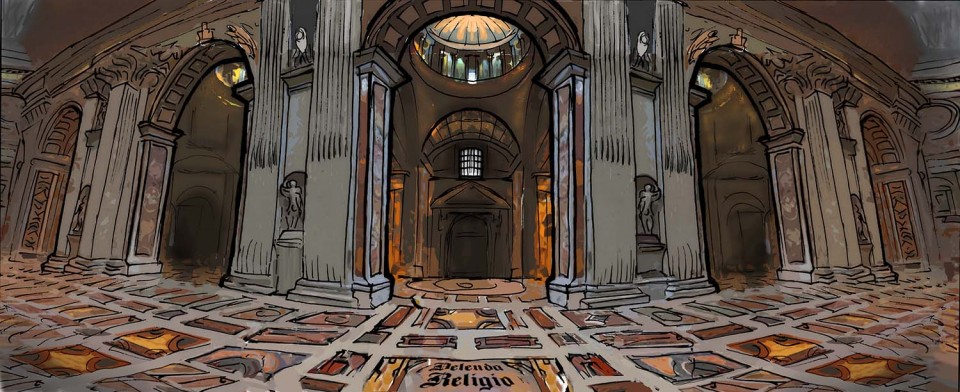Tags
"Le Nombre de Dieu", "Sobald das Geld", Compostella, Indulgences, José Juis Corral, Keys of the Kingdom, Luther, Mass Stipends, Plenary Indulgences, Purgatory, Relics, Rights of Burial, Vatican
Between spells churning out these rapid-fire posts as though I were trying to get it all off my chest before my ticker’s expiration date, I am reading an historical novel, “El Nùmero de Dios”, by Spanish author José Luis Corral, in French translation (“Le Nombre de Dieu”, Editions Hervé Chopin, Pari, 2015) about the building of a 13th century cathedral. The Burgos basilica would take thirty years to build – it took a stonemason a full day to chisel at very most just two stones – but also buckets of ducats. Financing ? No worries ! Indulgences and Rights of Burial : those plaques you see in the floor of cathedrals. It cost a fortune for the right to wait for the Last Judgement resting in peace in God’s house. But this revenue was peanuts compared with the cash to be made from the Church’s greatest exploitation of Christian credulity, summed up in the 16th century Lutheran jingle :
“Sobald das Geld im Kasten klingt, eine Seele aus dem Fegfeuer springt.” (“As soon as the gold in the coffer clinks, a soul out of Purgatory springs.”)
We’ve talked about this before, but this novel has got me thinking a little more about what had become established practice in Church finances already in the time of St Francis of Assisi. It has to be the cleverest scam the Church ever came up with. But if people bought as fact the biblical fables portrayed in the stained glass of their cathedrals, never challenged the supposed power of relics, ranging from a Saint’s pinkie to a phial of his blood to a piece of his underpants to bottles of Mary’s milk to Jesus’ Crown of Thorns (the wags add a feather from the dove that is the Holy Ghost) and the “miracles” they worked, and believed they could be cured by the healing waters of a “miraculous” mountain stream or a pilgrimage to Compostella, they could also be conned about reducing the time of suffering for their loved ones in Purgatory.
What struck me recently is the power the Church claimed to have received from God not only to forgive sins in His name, but to act as “administrator” (the word is in the Catholic Encyclopedia’s article on Indulgences) of the time to be spent in Purgatory “paying off the debt” – from partial indulgences of a certain number of days or years up to Plenary Indulgences, wiping the slate clean. If Jesus had given the Keys of the Kingdom of Heaven to Peter, what could stop the Church from awarding indulgences for pious acts like murdering Muslims in the Middle East or hanging heretics at home, or “good works” and acts of piety like making donations to the building and restoring of churches ? Luther would protest against the sale of indulgences for the construction of the Vatican basilica. But for centuries before, the gems of Gothic architecture – the cathedrals of Paris, Bourges, Chartres, Amiens and countless others throughout Christendom – would never have been built without exploiting the belief that the Church really could shorten the suffering of the Faithful Departed.
This is not fiction. The monuments to faith which we admire throughout Europe bear testimony to a credulity that alone should suffice for Believers on the Brink to see through the brainwashing of centuries of Catholic belief. If people can believe in Indulgences, they can believe anything the Church tells them they must believe. Even if we don’t hear a lot about Indulgences today, they remain part of Catholic doctrine. I can’t imagine anyone following my example today, but let me remind you that as a kid I spent my time at daily Mass accumulating indulgences for the Poor Souls in Purgatory, by reciting the prayers and “ejaculations” (!) in my precious little pamphlet, “The Golden Book of Indulgences”. I must have saved one hell of a lot of people from Purgatory.
Priests get paid to perform funeral rites and to recite the prayers for the dead. But the Church also claims that it can improve the fate of the deceased and accelerate their entry into Heaven by having priests celebrate Masses paid for by stipends. Blessed are the gullible !
RIDENDA RELIGIO

Blessed are the gullible for they shall soon be separated with their money
LikeLiked by 1 person
Oh dear – and here was I hoping beyond hope that my stash of Plenary Indulgences would stand me in good stead on the last day. I say my stash of Plenaries even though only one would suffice according to the tale sold to us as kids to ensure my fast track entry into Heaven.
My stash was earned by receiving Communion (the body and blood of Christ in the Eucharistic wafer) during attendance at Mass (the reenactment of the sacrifice of Jesus, the Son of God on the cross at Calvary) on nine consecutive first Fridays (that is the first Fridays in nine consecutive months). I calculated that I had a stash of at least nine Plenary Indulgences earned in this fashion (one for each lot of nine first Fridays).
If anyone is interested in purchasing one I will consider any reasonable offer.
LikeLiked by 1 person